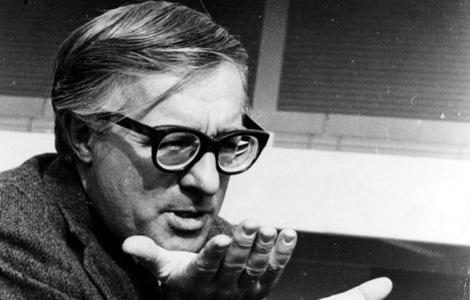Bradbury Meets the Astronauts
They were bound for the moon, but he had already been to Mars.
Ray Bradbury, author of The Martian Chronicles and other landmark books of science fiction, passed away last night at the age of 91.
In his 2006 biography, The Bradbury Chronicles, Sam Weller tells about the time the famous author was assigned by LIFE magazine to write about the Apollo astronauts. Arriving in Houston on January 13, 1967, just a couple of weeks before the tragedy of the Apollo 1 fire, Bradbury visited the Johnson Space Center.
Right from the start, Ray encountered fans. One of the first NASA administrators Ray met told him that his favorite book was Dandelion Wine. Ray spent the afternoon touring the NASA facilities, taking in the vast technologies: flight simulators, lasers, flight suits, and the centrifuge, in which astronauts were exposed to g-forces.
That evening, Ray dined in Houston with astronauts Jim Lovell and John Young, Richard Gordon and Pete Conrad and their wives. “Gordon and Young have qualities of Buck Jones, Bob Steele, Tom Mix about them,” Ray wrote in his notes. “They are short, compact men, economically built. Young is shy. Gordon more direct, but there is the familiar echo of the intellectual cowpuncher here. Something out of my own memory perhaps. Conrad is the clown of the bunch, much fun to watch and listen to. Lovell very friendly and easy and the proverbial host.”
In the days that followed, while visiting the Johnson Space Center, Ray attended a press briefing. He sat in the back of the conference room as one by one the young horses were trotted out—nearly sixty Apollo astronauts, as Ray recalled, the primary teams and the alternates. They were all present: Armstrong, Aldrin, Grissom, Lovell. They were clean-cut kids, all-American types, with blindingly white smiles and military crew cuts, and courage taller and mightier than the Saturn rockets they would ride on. When someone in the room announced that Ray Bradbury was present—Ray Bradbury, the author—at least half of the astronauts looked up, alert, scanning the room excitedly. Several of them approached Ray after the conference. As young dreamers with imaginations fixed squarely on the stars, many of them credited Ray, and specifically The Martian Chronicles, as an early inspiration. Ray suddenly found himself surrounded by American heroes, who were worshiping him. The kid from Green Town—Buck Rogers, as so many in the literary community had disparagingly deemed him—had done good.
